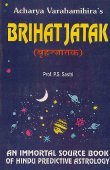Varahamihira, Varāhamihira, Varaha-mihira: 7 definitions
Introduction:
Varahamihira means something in Hinduism, Sanskrit, the history of ancient India. If you want to know the exact meaning, history, etymology or English translation of this term then check out the descriptions on this page. Add your comment or reference to a book if you want to contribute to this summary article.
India history and geography
Source: academia.edu: The Date of AryabhataVarahamihira (Saka 427 & Saka 509) [156-74 BCE].—Varahamihira mentions Aryabhata in his work “Panchasiddhantika”. Varahamihira records Saka 427 elapsed (156-155 BCE) as Karanabda for calculation of Ahargana (counting of days). Amaraja Daivajna, who wrote a commentary on “Khandakhadyaka” of Brahmagupta, mentions that Varahamihira died in Saka 509 (74 BCE). Considering the epoch of Saka era (583 BCE), Varahamihira undoubtedly lived between 156 BCE and 74 BCE.
Source: Shodhganga: a concise history of Sanskrit Chanda literature (history)Varāhamihira (वराहमिहिर) (C. 550 C.E.), son of Ādityadāsa alias Rudrapaśu and resident of Avantī and father of Pṛthuyaśas (author of Ṣaṭpañcāśikā) is well known among scholars for his scholarship on Indian Astronomy and Mathematics. He has recorded the ancient Indian wisdom through his encyclopedic work Bṛhatsaṃhitā very crisply. The Bṛhatsaṃhitā incorporates many subjects of many disciplines and presents them in a unique way. The purpose of the author is to illustrate all branches of learning and thus names his work as Bṛhatsaṃhitā: a big collection. Out of chapters, the 104th Chapter deals with the metres of Sanskrit.

The history of India traces the identification of countries, villages, towns and other regions of India, as well as mythology, zoology, royal dynasties, rulers, tribes, local festivities and traditions and regional languages. Ancient India enjoyed religious freedom and encourages the path of Dharma, a concept common to Buddhism, Hinduism, and Jainism.
Languages of India and abroad
Sanskrit dictionary
Source: DDSA: The practical Sanskrit-English dictionaryVarāhamihira (वराहमिहिर).—Name of a celebrated astronomer, author of बृहत्संहिता (bṛhatsaṃhitā) (supposed to be one of the 'nine gems' at the court of king Vikrama).
Derivable forms: varāhamihiraḥ (वराहमिहिरः).
Varāhamihira is a Sanskrit compound consisting of the terms varāha and mihira (मिहिर).
Source: Cologne Digital Sanskrit Dictionaries: Cappeller Sanskrit-English DictionaryVarāhamihira (वराहमिहिर).—[masculine] [Name] of an astronomer.
Source: Cologne Digital Sanskrit Dictionaries: Aufrecht Catalogus Catalogorum1) Varāhamihira (वराहमिहिर) as mentioned in Aufrecht’s Catalogus Catalogorum:—son of Ādityadāsa, father of Pṛthuyaśas. In the Pañcasiddhāntika he takes 506 Ad. as the epoch year of his calculations: Ārūḍhajātaka. Kālacakra. Kriyākairavacandrikā (?). Mysore. 3. Jalārgala. Oppert. Ii, 3146. This is the 54th chapter of the Bṛhatsaṃhitā, entitled Dagārgala. Jātakakalānidhi. Jātakasarasī. Jātakasāra, probably the Laghujātaka. Daivajñavallabhā. Pañcasiddhāntikā. Praśnacandrikā. Prāsādalakṣaṇa. Oppert. Ii, 2959. This is the 56th chapter of the Bṛhatsaṃhitā. Bṛhajjātaka or Horāsāra q. v. Bṛhatsaṃhitā. Bṛhadaṣṭavarga. Oppert. 1287. The ninth adhyāya in the Bṛhajjātaka is called Aṣṭakavargādhyāya. Bṛhadyātrā. Mayūracitraka. Muhūrtagrantha. Yogayātrā. Yogārṇava. Laghujātaka or Sūkṣmajātaka or Svalpajātaka. Vaṭakalikā. Sārāvalī. Varāhamihirīya jy. Oppert. Ii, 5560. Some verses of his are given in Aucityavicāracarcā 26, Śp. p. 82. [Sūktikarṇāmṛta by Śrīdharadāsa] [Subhāshitāvali by Vallabhadeva]
2) Varāhamihira (वराहमिहिर):—Jātakārṇava (?). Saṃvatsaraphala.
3) Varāhamihira (वराहमिहिर):—Aṅkacūḍāmaṇi. Pratyantaradaśāsaṃgraha.
Source: Cologne Digital Sanskrit Dictionaries: Monier-Williams Sanskrit-English DictionaryVarāhamihira (वराहमिहिर):—[=varāha-mihira] [from varāha] m. Name of an astronomer (son of Āditya-dāsa and author of the Bṛhaj-jātaka, Bṛhat-saṃhitā, Laghu-jātaka, Yoga-yātrā, Pañca-siddhāntikā; in the last of these works he takes 506 A.D. as the epoch of his calculations), [Indian Wisdom, by Sir M. Monier-Williams 176 etc.]
[Sanskrit to German]
Sanskrit, also spelled संस्कृतम् (saṃskṛtam), is an ancient language of India commonly seen as the grandmother of the Indo-European language family (even English!). Closely allied with Prakrit and Pali, Sanskrit is more exhaustive in both grammar and terms and has the most extensive collection of literature in the world, greatly surpassing its sister-languages Greek and Latin.
See also (Relevant definitions)
Partial matches: Mihira, Varaha.
Starts with: Varahamihirahora, Varahamihirasamhita.
Full-text (+7966): Yavanacarya, Avanisha, Prithuyashas, Parvatashrayin, Ghatakara, Candratmaja, Kshitisuta, Mrigeshvara, Manujeshvara, Nabhastala, Mukharuj, Rangopajivya, Pratibhairava, Gandhambhas, Jaladravya, Daityejya, Dhananvita, Dhanyakuta, Tuhinakirana, Mangalashabda.
Relevant text
Search found 34 books and stories containing Varahamihira, Varāhamihira, Varaha-mihira, Varāha-mihira; (plurals include: Varahamihiras, Varāhamihiras, mihiras). You can also click to the full overview containing English textual excerpts. Below are direct links for the most relevant articles:
Rasa Jala Nidhi, vol 5: Treatment of various afflictions (by Bhudeb Mookerjee)
Part 17 - Chemists of the Metallic School: Nagarjuna < [A Brief History of Indian Chemistry and Medicine]
Part 14 - Chemists of the Metallic School: Shambhu < [A Brief History of Indian Chemistry and Medicine]
Part 21 - Chemists of the Metallic School: Govinda or Bhikshu Govinda < [A Brief History of Indian Chemistry and Medicine]
Brihat Samhita (by N. Chidambaram Iyer)
Appendix 7 - The five elementary principles that compose the physical man
Appendix 1 - Calculations regarding Śaka and Jupiter (Bṛhaspati)
Buddhist records of the Western world (Xuanzang) (by Samuel Beal)
Chapter 6 - Country of San-mo-ta-ch’a (Samotaṭa) < [Book X - Seventeen Countries]
Chapter 15 - Country of Kie-pi-ta (Kapitha) < [Book IV - Fifteen Countries]
Chapter 9 - Country of Su-lo-k’in-na (Srughna) < [Book IV - Fifteen Countries]
Significance of the Moon in Ancient Civilizations (by Radhakrishnan. P)
8. Contributions of Varahamihira < [Chapter 2 - A Sceintific Outlook on Astrology]
3. Vedic Astrology and Kala Hora < [Chapter 5 - Adoration of the Sun and Moon]
4. The Moon and Weather < [Chapter 15 - Conclusion]
Charaka Samhita and Sushruta Samhita (by Nayana Sharma)
Epidemics (maraka) < [Chapter 6]
Atharvaveda and Charaka Samhita (by Laxmi Maji)
Varāhamihira (Āyurveda scholar) < [Chapter 1 - Introduction]
Related products

